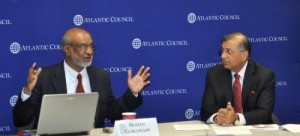What should we call the Dalai Lama? It might seem like a silly enough question… but if you look deeper, there lies a more substantial issue of basic respect and mutual understanding. On Davidpeng’s blog (in an article linking to one of our entries)… an interesting discussion has developed (
原贴) on that exact topic.
One commenter (Flatfish, a frequent Tibetan visitor) reacted to part of the original discussion when the term “the Dalai” was used:
In reference to the proper name for the Dalai Lama, let me talk about a few related things that have touched me deeply.
After the end of the Second World War, a court sentenced Mr. Hideki Tojo to death by hanging. Mr. Tojo immediately stood, and with perfect manners bowed deeply to the judges; he didn’t say another word. When the Tibetan uprising (in 1959) expanded, quite a few Tibetans were executed. Before they were shot, they politely said “T’oo-Je-Che” (Tibetan term of thanks). Later, when the families of the executed were charged expenses of 200-500 RMB, they again said “T’oo-Je-Che”, and nothing else.
For the Dalai Lama, the respectful way of referring to him in English is: His Holiness the Dalai Lama. In Tibetan, the respectful way of referring to him is Jiawa Renbuqie (嘉瓦仁布切,Gyalwa Rinpoche), Kundun (昆顿), or Yixi Loubu (益西罗布, Yeshe Norbu). Tibetans would never use the name Dalai Lama, because that’s actually equivalent to a title, and not a name.
My point is, if any group or government investigates and finds the Dalai Lama guilty of a crime, then all of these details could be revealed to the public, and they could proceed to trial and conviction. And if anyone, including Han, have doubts or criticisms of him, that’s also not a problem. And for those who are not Buddhists and not Tibetan Buddhists don’t necessarily have to refer to him by his courtesy title. But all should respect basic human rights, and do not casually shorten the title Dalai Lama to just “the Dalai”.
Continue reading »
 I came across two articles recently, both concerning India/China relations but one written from the Chinese point of view while the other was written from the Indian side. I thought it might be interesting to compare the two viewpoints to see just how far apart they really are.
I came across two articles recently, both concerning India/China relations but one written from the Chinese point of view while the other was written from the Indian side. I thought it might be interesting to compare the two viewpoints to see just how far apart they really are.

Recent Comments